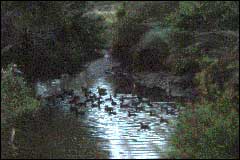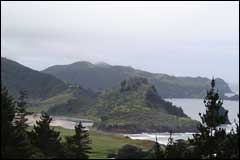Maori on Great Barrier Island
 The early inhabitants of Aotea had a plentiful food supply. The brown teal was one species they hunted. |
|
 Many people lived along the east coast at places like Awana Bay |
Aotea (Great Barrier Island) was believed to be a scale flicked from the back of the giant fish - Te Ika a Maui - when it was cut and slashed by Maui's brothers. The scale lay on the surface of the sea until Kupe and his fellow explorers arrived.
Kupe was the first Maori explorer to arrive from east Polynesia and made landfall at this island. They named the island Aotea - White Cloud. It is one of the longest inhabited places in New Zealand.
Ngati Rehua a hapu of Ngati Wai have lived on Aotea for many hundreds of years. The coastline of the island has been home to many families as well as the location of strategic defence sites (pa) and cropping areas. Fortifications, terraces, storage pits can be found in settlement areas around the island. Middens (food waste pits) are rich sources of information about how people lived and what food they ate.
Ngai Tai and Marutauhu also have ancestry on the island.